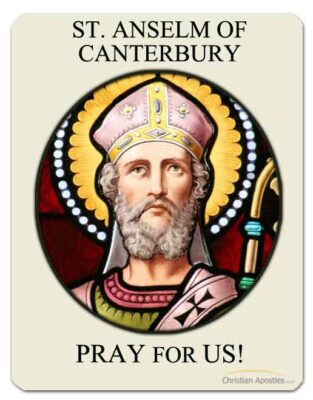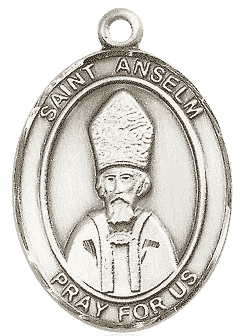Saints
St. Anselm of Canterbury Medal
St. Anselm Biography
 St. Anselm of Canterbury was a medieval monk, philosopher, and theologian who lived from 1033 to 1109. He was born in Italy in the town of Aosta, but later moved to Normandy in France. Anselm was well-educated, fluent in Latin and Greek, and had a deep interest in both secular and religious learning.
St. Anselm of Canterbury was a medieval monk, philosopher, and theologian who lived from 1033 to 1109. He was born in Italy in the town of Aosta, but later moved to Normandy in France. Anselm was well-educated, fluent in Latin and Greek, and had a deep interest in both secular and religious learning.
Anselm became a monk at the monastery of Bec in Normandy in 1060, and quickly made a name for himself as a brilliant and devout monk. He was appointed prior (second-in-command) of the monastery in 1078, and later served as abbot (head) from 1078 to 1093. During his time as abbot, he established a school at Bec that attracted students from all over Europe.
In 1093, Anselm was appointed archbishop of Canterbury, the highest position in the Church of England. As archbishop, he played an important role in the politics of the time, frequently engaging in conflicts with King William II of England and later King Henry I over the issue of lay investiture (the practice of lay rulers appointing bishops and abbots). Anselm was exiled twice by the king, first in 1097-1098 and then in 1103-1106.
Despite the political conflict, Anselm is best known for his contributions to theology. He is considered one of the most important Christian thinkers of the Middle Ages and is sometimes referred to as the “Father of Scholasticism.” He is most famous for his work “Proslogium,” in which he introduced the famous “ontological argument” for the existence of God. This argument states that, in the mind, there is a concept of a “being than which nothing greater can be conceived” and that, since existence is greater than non-existence, this being must exist in reality.
He wrote several works on the nature of Christ and the Trinity, and argued that the Trinity is one God in three persons, coequal and coeternal. Anselm’s theory of the Atonement, which explained how Jesus’ death on the cross could be an act of satisfaction to God, was also an important part of his theology. Anselm also composed an influential work known as “Cur Deus Homo” (Why did God become Man?), an explanation of the reason and necessity of the incarnation of Jesus Christ.
Anselm also wrote on many topics such as, the nature of free will, the relationship between faith and reason, and the nature of the soul. He also wrote extensively on meditation and contemplation, encouraging the use of reason to deepen one’s understanding of God. Anselm’s work was widely read and influential in the development of medieval philosophy and theology, and his ideas continue to be studied and debated today.
Anselm died in 1109 and his tomb at Canterbury Cathedral became an important site for pilgrimage. He was canonized as a saint by Pope Honorius III in 1218, and is venerated in the Catholic Church as the patron saint of philosophers and theologians.
Anselm’s work had a profound impact on the development of Western Christianity. His ontological argument for the existence of God set the stage for centuries of debate and dialogue on the relationship between faith and reason. His theology on the Atonement and the Trinity also had a far-reaching impact on the doctrine of the church. His ideas are still read, studied and debated by scholars, theologians and philosophers.
The Life of St. Anselm
St. Anselm was born in northern Italy, about 1033. Very early in life he displayed a desire to join monastic life, so much so that when he learned that his father destined him for a military and courtly career, he prayed for an illness which might preserve him the duty. His prayer was heard; yet it was some time before he obtained his desire to become a religious.
After entering the monastery at Bec in Normandy, not many years passed before he was appointed its Prior and subsequently was elected Abbot. He was made Archbishop of Canterbury during the Lent of 1093, in spite of his protestations.
St. Anselm’s Struggle
King William II who had fallen seriously ill, vowed to make up for all the wrongs he had committed against the Church, named Anselm to the vacant see of Canterbury. However, when his health returned, the King relapsed into his former sins, plundered the Church lands and scorned the Archbishop’s rebukes, forbidding him to go to Rome to receive the Pallium.
To settle these difficulties a Council was called at Rockingham, in Northamptonshire. The Archbishop addressed his people and explained that the first business was to discuss the obedience due to Pope and King respectively. The Bishops, frightened, would not stand by him, but the barons sided with the Saint, for they respected his courage and saw that his cause was their own.
Rather than yield to the King, the Archbishop went into exile. At last the King was obliged to submit to the holy, aged Archbishop. St. Anselm is known as the father of scholastic theology, and is famous for his devotion to Our Lady, as he established the Feast of the Immaculate Conceptions. It was on Wednesday in Holy Week, April 21, 1109, in the 16th year of his bishopric, and the 76th year of his life, that St. Anselm breathed his soul into the hands of his Creator.
Prayer to St. Anselm of Canterbury
Prayer written by St. Anselm
O my God, teach my heart where and how to seek You,
where and how to find You.
You are my God and You are my all and I have never seen You.
You have made me and remade me,
You have bestowed on me all the good things I possess,
Still I do not know You.
I have not yet done that for which I was made.
Teach me to seek You.
I cannot seek You unless You teach me
or find You unless You show Yourself to me.
Let me seek You in my desire,
let me desire You in my seeking.
Let me find You by loving You,
let me love You when I find You.Amen
Popular St. Anselm Items
A St. Anselm of Canterbury medal or a St. Anselm of Canterbury rosary is a perfect gift to give to a young man who has chosen St. Anselm as their confirmation name. Wearing a St. Anselm medal daily is a perpetual prayer for Saint Anselm to intercede on behalf of the wearer. As saints are united closer to God, their prayers are more efficacious, and enriches your own prayer.
Additionally, a Saint Anselm of Canterbury pendant is a reminder to emulate the example of the holy saint as you live your life. What a beautiful testament of faith to share with the world, or to keep discretely tucked under your clothes. During the challenging moments of your day, reflect upon the holy life of St. Anselm of Canterbury and pray for their intercession and protection.
Patron Saints - A's
St. Anselm of Canterburyis the patron saint of
St. Anselm of Canterbury is the patron saint of theologians and philosophers. He was born in Italy in 1033 and later became a Benedictine monk. He was eventually appointed as the Archbishop of Canterbury in England, where he played a prominent role in the development of the medieval church. He is best known for his work in theology, particularly his book “”Proslogion”” which presents the ontological argument for the existence of God. He is venerated for his deep faith and his contributions to the field of theology.
Here are two prayers to St. Anselm of Canterbury:
“St. Anselm, you were a man of great faith and wisdom. Help me to seek knowledge with humility, and to use it to serve others. Inspire me to deepen my understanding of the mysteries of the faith, and to grow in my relationship with God. Amen.”
“O St. Anselm, who with the light of your brilliant mind, illuminates the path of humanity to God. Obtain for us your intercession, so that we may be able to understand and love with all our hearts, the mysteries of the faith. Amen””
Reflection on the feast day of St. Anselm of Canterbury
The feast day of St. Anselm of Canterbury is April 21st.
St. Anselm of Canterbury was a medieval Catholic bishop, theologian, and philosopher who lived in the 11th and 12th centuries. He is considered one of the most important figures in the history of Christian theology and is known for his famous work “”Proslogion,”” which contains the ontological argument for the existence of God.
On his feast day, we remember the life and legacy of St. Anselm and the lessons we can learn from him. One of the most important things to take away from the life of St. Anselm is his commitment to reason and logic in his pursuit of understanding and explaining the Christian faith. He believed that faith and reason were not mutually exclusive, but rather that reason could be used to deepen one’s understanding of faith.
Another important lesson we can learn from St. Anselm is his emphasis on the importance of humility. He believed that true wisdom comes from humility and the willingness to admit one’s own ignorance and seek out knowledge and understanding.
We can also learn from St. Anselm’s devotion to God. He was a monk and a bishop who dedicated his life to the service of God. He believed that the purpose of human existence is to know and love God, and that all human knowledge and wisdom should be directed towards this end.
As we celebrate the feast day of St. Anselm of Canterbury, let us reflect on the lessons we can learn from him and be inspired by his example to use reason and logic in our pursuit of understanding the faith, to be humble and to seek knowledge and understanding, and to be devoted to God.
In these ways, we can follow in the footsteps of St. Anselm and become true seekers of knowledge, wisdom and understanding, who, as he once said, “The mind seeks to understand in order to believe, and it believes in order to understand.””
Discover biographies, prayers, and reflections for more than 400 Catholic Saints
Saints Similar to St. Anselm of Canterbury
You may also be interested in reading the Biography of St. Thomas A Becket. St. Anselm of Canterbury and St. Thomas Becket were both influential figures in the history of the Catholic Church in England. St. Anselm was the Archbishop of Canterbury and a philosopher-theologian. St. Thomas Becket was also an Archbishop of Canterbury and known for his stand against the king’s interference in Church matters. Next up: Biography of St. Anthony Abbott
Also check out our handmade St. Anselm of Canterbury Medal and St. Anselm of Canterbury Rosary and St. Anselm of Canterbury Rosary Bracelet.



